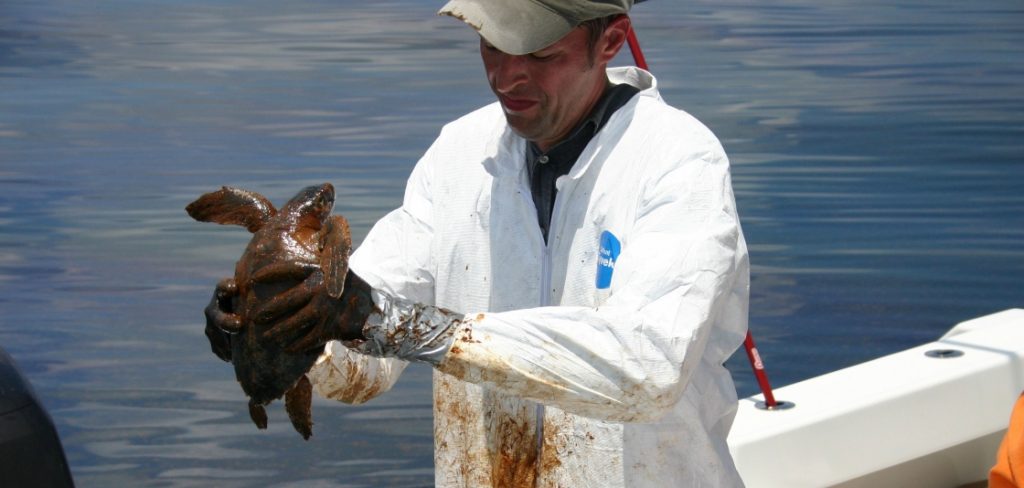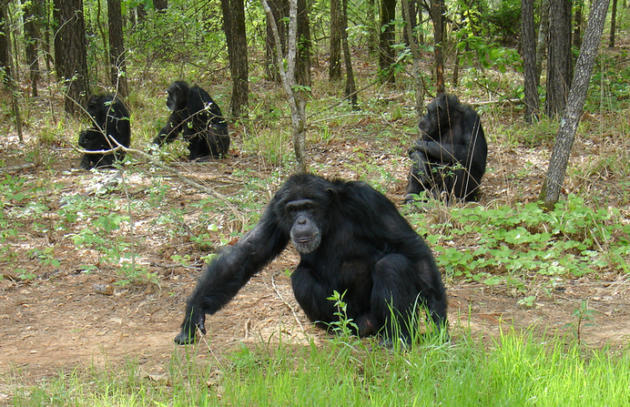Since 2015, we’ve presented our annual list. We present our annual list in two parts. Part I lists the notable stories that affected animals during 2019. In Part II, we look at the 2010s with the most important stories year-by-year, an analysis of developments and trends. A remarkable number of these stories and issues have spanned the decade.
Don’t see a story you think deserves attention? Want to comment — or challenge — our choices? We welcome feedback: contact us at info@attorneysforanimals.org; or message us on FaceBook.
2010

Deepwater Horizon Aftermath
Oiled Kemps Ridley Sea Turtle, Gulf of Mexico (Credit: NOAA and GA Dept of Natural Resources)
- Deepwater Horizon Explosion and Oil Spill in Gulf of Mexico and harm to wildlife–
Image: Eric Grigorian/Polaris2019: Still in the news as the federal government announces plans to restore fish, sea turtles, marine mammals and deep-sea coral habitat harmed; and concerns about corporate responsibility for these disasters remains - SeaWorld trainer killed by Tilikum which drew attention to orcas in captivity; the decade saw the release of Blackfish which caused the company’s stock to fall; although attendance records were up in 2019; Tilikum’s death; and at decade’s end, SeaWorld announces the end of its killer whale show at Orlando starting Jan. 1, 2020
- Genetically Modified Salmon: FDA advisory panel to consider human safety, environmental impact; by 2019, the FDA announced final approval for sale of GM salmon in the US, after a decade of indecision with questions remaining
- Congress passes the Animal Crush Video Prohibition Act of 2010; one of 2019’s top stories was passage of the PACT Act, called the first federal animal cruelty law, which closed a loophole in the 2010 law, by outlawing the underlying cruelty
- Hawaii becomes the first state to pass a ban on shark finning; 2019 bill in Congress would ban the cruel practice nationwide, while Canada became the first G-20 nation to ban it
- The Department of Justice published revised final regulations implementing the Americans with Disabilities Act, to clarify issues that have arisen over the past 20 years since the law went into effect; in 2019, “service” versus “emotional support” animal remains a contentious, even emotional, issue, with claims of fake ESA’s and confusion between the two categories
- Wolves: in lawsuit challenging the decision to de-list a portion of the gray wolf population in Montana and Idaho, the court held that the decision did not comply with the Endangered Species Act, Defenders of Wildlife v Salazar, 729 F. Supp. 2d 1207, 1210 (D. Mont. 2010). This has been a red-hot issue throughout the decade, with efforts by the United States Fish and Wildlife Service and in Congress to de-list them, as well as resolutions by the Michigan Legislature. In 2019, the USFWS published a proposed rule that would substantially weaken the ESA, and is in the process of reviewing public comments.
Deepwater restore corporate
SeaWorld trainer killed decade Tilikum's death end
GM Salmon FDA questions remaining
Crush Video 2010 PACT Act
Shark Finning Hawaii Congress Canada
ADA service emotional support
Wolves here and here
2011
- Rocky Mountain Gray Wolves de-listed in most of their range (not Wyoming until 2017), at the direction of Congress thereby making it a political rather than scientific decision and removing it from judicial review; management turned over to the states; hunting seasons instituted
- Tony, a tiger exhibited displayed at a Louisiana truck stop was the subject of litigation throughout most of the decade. Tony died in 2017; sadly, he was never released to sanctuary because of various legal and legislative maneuvers by the owner. Even after his death, ALDF carried on a lawsuit. (Tony, courtesy of ALDF)

- Zanesville, OH exotic animal massacre, when the owner of a “notorious” wild animal preserve set 56 of his animals loose and then killed himself. Fearing for public safety, law enforcement killed 48 of the animals, including 18 Bengal tigers, 17 lions, six black bears, two grizzlies, three mountain lions, a wolf and a baboon. One wolf was found dead and a monkey had been eaten by one of the cats. One grizzly bear, three leopards and two monkeys survived. The owner had a history of animal abuse and neglect. Ohio had among the weakest restrictions on exotic pets. As a comprehensive database indicates, the exotic pet trade remains a multi-billion dollar per year business and results in suffering of animals taken from the wild.
- Chimpanzees in research: after opposition to a controversial National Institute of Health decision to take 200 chimps out of retirement at the Alamogordo facility and transfer them to a lab for invasive studies, Congress requested a study of the use of chimpanzees in research. The panel concluded that most research was unnecessary, and the NIH announced it would not authorize any research involving chimps until the panel’s recommendations had been implemented. In 2015 NIH banned the use of chimps in research and would retire them to Chimp Haven, a sanctuary. That proved easier said than done: at the end of 2019, the NIH announced that 44 chimps at Alamogordo were too ill to be transferred to sanctuary, prompting lawmakers to call for a reconsideration of the decision, calling it a violation of the CHIMP Act.
Wolves political
Tony litigation death carried on
Zanesville 56 animals database pet trade
Chimps Alamogordo NIH 2015 44 chimps lawmakers CHIMP Act
2012
- Ag Gag laws gaining traction as Iowa and Utah both pass anti-whistle blower laws making it a crime to make undercover recordings of industrial agriculture facilities; they are widely seen as industry’s response to damaging undercover videos with graphic depictions of animal cruelty. This issue surfaces throughout the decade, with challenges successful in UT and ID (2017 and 2015, respectively). Many national animal organizations have joined with the ACLU and others to challenge the laws as they are enacted through the decade. ALDF and ASPCA both have detailed discussions and timelines of ag-gag activity to 2019, with litigation challenging other states’ laws continuing into the new decade.
- Foie gras is a “delicacy” derived from the diseased livers of geese or ducks as a result of force feeding; it’s name means “fat liver” in French. A California ban went into effect in 2012. The ban was overturned in 2015 because it interfered with federal law; however the ban has been upheld on appeal several times throughout the decade, against preemption and dormant commerce clause claims (similar to arguments made in challenging laws regulating conditions of farmed animals). A suit against a foie gras manufacturer alleging its claims that the product was “humane” was successful; one to force the USDA to label the product as derived from diseased animals was not. 2019 saw the California ban again upheld on appeal; and the passage of a ban in New York City.
- “Downer” animals: The US Supreme Court invalidated a California law regulating the treatment of non-ambulatory pigs at federally inspected slaughterhouses, holding that federal law pre-empted the state’s. National Meat Assn v Harris, 565 U.S. 452 (2012). This issue remains current and pigs remain unprotected. In fall 2019, the USDA denied a petition to require downer pigs be euthanized, saying the current regulations are sufficient to guarantee both food safety and humane treatment of the animals, while at the same time “modernizing” regulations which will allow pig slaughter plants to operate at unlimited line speeds, prompting suits by both animal welfare and workers organizations.
Ag Gag ALDF ASPCA
Foie gras
Downers US Supreme Court USDA denied

